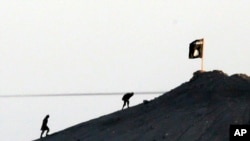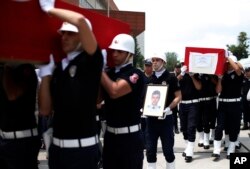Ankara has promised not to let up in its air strikes against the PKK as part of its declared twin-pronged war against the Kurdish rebels and Islamic State extremists. But the Turkish public appears reluctant to support the PKK crackdown.
Turkey is facing the twin threats of terrorism by the Islamic State and PKK Kurdish separatists, according to President Recep Tayyip Erdogan’s ruling AK Party. But for the past few days, air strikes have been almost exclusively aimed at the Kurdish rebel group’s bases in neighboring Iraq.
For three decades the PKK has been fighting for greater minority rights. But a recent opinion poll in Turkey found the majority saw the jihadists as the biggest threat to the country’s border.
Political columnist Semih Idiz of Turkey’s Cumhuriyet newspaper and Al Monitor Website, says much of the Turkish public is deeply skeptical about the operation against the PKK.
"For the past two or three years, the government has been conducting a dialogue process with this organization," said Idiz. "The fact that it is divorcing this dialogue process for possibly its own political ends only increases the suspicions about this government."
Internal politics
President Erdogan’s AK Party is being accused of using the crackdown on the PKK to garner nationalist votes and marginalize the pro-Kurdish HDP party, whose success in the recent general election resulted in the AK party losing its majority.
On Saturday, a group of well known public figures known as the wise men, who were selected last year by President Erdogan to promote a peace process with the PKK, called for a cease-fire and resumption of the peace efforts.
Political scientist Cengiz Aktar of Istanbul’s Suleyman Sah University says there is popular support for a return to the peace process, but it is being suppressed.
"People were readying for the 26th of July for a big peace march, and it was forbidden. And it would have certainly been a big, big march gathering many different segments of the Turkish society. It was forbidden by the authorities on purpose because they were afraid of the size of the movement," said Aktar.
Crackdown on protesters
Recent legislation allows the use of live ammunition by security forces, and President Erdogan has warned they would use the full scope of their powers to prevent any illegal protest.
But columnist Idiz says despite the growing rhetoric by the governing AK Party and its media, aimed at the PKK, and increasingly Kurdish political figures, much of the public remains more concerned about the cost and risks of conflict.
"We have not had any body bags coming from the southeast for nearly three years now, and that has been broken overnight," said Idiz. "Body bags have started and we are back to initial images of funerals, and trying to marginalize elected politicians because they are Kurdish, and promote a Kurdish line, and all this. I do not think the public is ready for this, I do not think the public is ready either for the economic instability this will create."
Such reluctance is likely fueled by memories of the 1990’s, which saw a full-scale conflict against the PKK claiming more than 40,000 lives and almost bankrupting the economy.
With the AK party’s coalition-building efforts struggling, the country could face a November general election. Analysts warn the AK party could end up paying a high political price.





